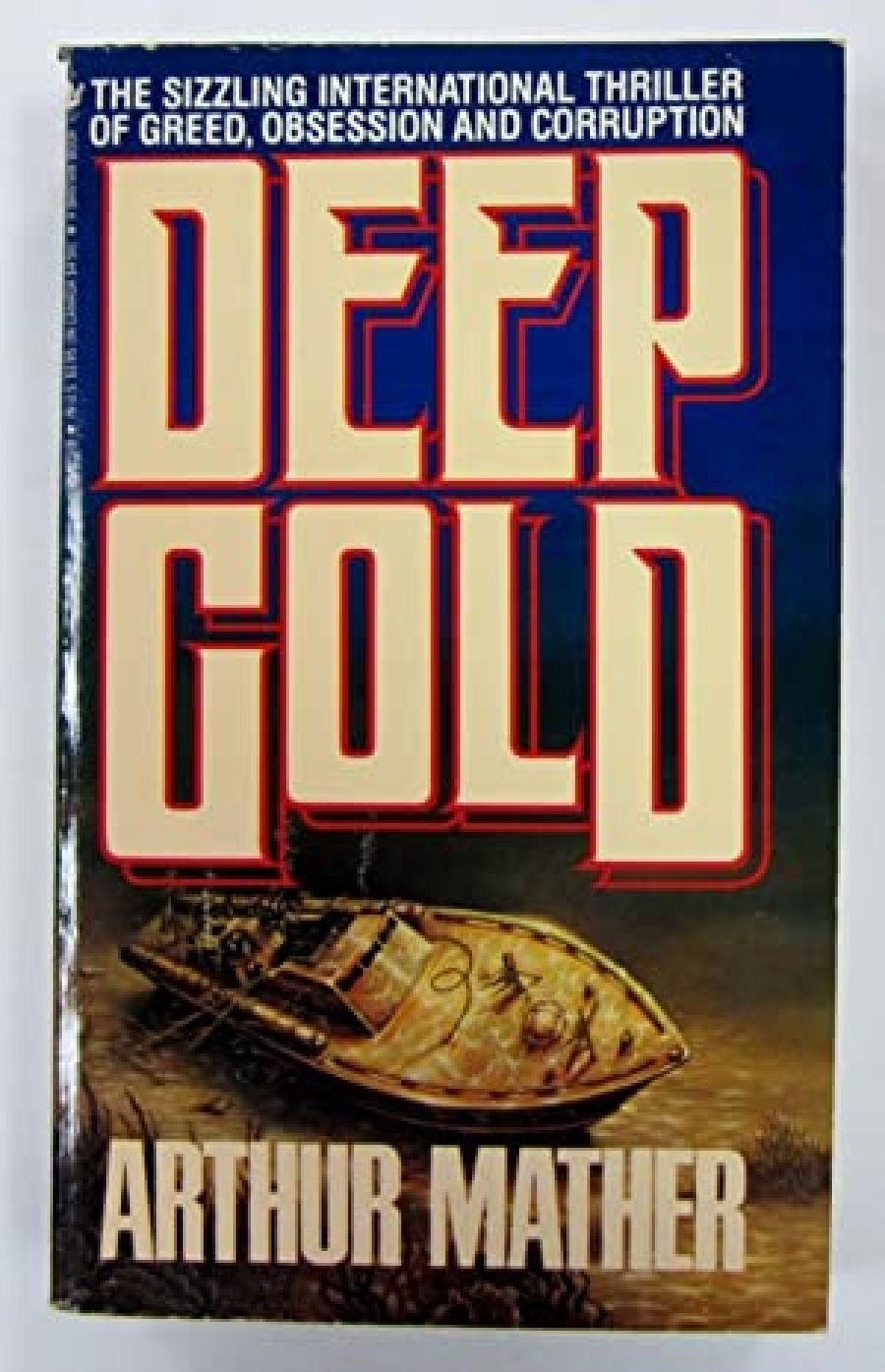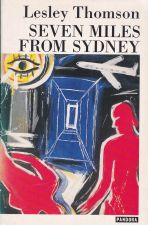
- Free Article: No
- Contents Category: Fiction
- Review Article: Yes
- Article Title: Crime wave in Aussie publishing: Editors baffled
- Online Only: No
- Custom Highlight Text:
Ignored by literary historians, consumed quietly by the reading public, Australian crime fiction has been evident enough to readers of Miller and MacCartney’s classic bibliography, and restates its bloodied but unbowed presence in two forthcoming reference tools: Margaret Murphy’s Bibliography of Women Writers in Australia, many of whom write thrillers, and in Allen J. Hubin’s near-future third edition of his international bibliography of crime fiction, in which Michael Tolley of the University of Adelaide will exhaustively update and correct the Australian entries.
- Book 1 Title: Deep Gold
- Book 1 Biblio: Bantam, 298 pp, $8.95 pb
- Book 2 Title: Seven Miles from Sydney
- Book 2 Biblio: Pandora, 205 pp, $9.95 pb
- Book 2 Cover Small (400 x 600):

Always there as it has been, local crime fiction is, like a growing joey, becoming increasingly obvious in public. Angus and Robertson are reprinting in a stylish format the internationally successful novels of Arthur Upfield. That more youthful veteran, Peter Corris, is a regular product from Allen and Unwin, who are also having success with new ‘quality’ thriller writers Jennifer Rowe and Bob Brissenden.
A further-reaching sign of the bloodstained boomerang is the tendency for the international thriller, that colourful pox of the airport bookstalls, to include Australian sequences. Crocodile Dundee may be a factor here, every crime writer yearns for the feel of a Hollywood contract between the teeth.
Arthur Mather’s Deep Gold (Bantam) mixes Manhattan murder with wartime intrigue and makes its narrative vanishing point a US navy boat sunk in New Guinea waters with a cargo of Japanese gold. Pacific militarism sells well in the States, especially when sauced with Australian locale, but this is a skilful quest story with a definite trace of, perhaps not deep insight, at least a creative writing class or two.
A little more homespun, though not without native vigour, is The Whittington Pact by Leon Le Grand (Collins Australia). Said not to be pseudonymous, Le Grand is also alleged to have been a millionaire Melbourne businessman before turning to literary markets. Perhaps it’s just fortuitous that his story is all about forgery, on a brain-numbing switchback from an arsonated printery in North Carlton to the councils of the mighty in Washington and Whitehall.
While the plot is not much more than a compendium of criminographical cliches, The Whittington Pact does have its own level of thoughtful attention to event and motive, and at least this Australian source is not tainted by the strains of sado-masochism that often attend airport thrillers and are usually signalled by a black, white, and red cover, suitably Nazi colours for nastily mindless content.
Further up the scale of subtlety comes Roland Perry’s Blood is a Stranger (W.H. Allen). Not a good title for a rather interesting novel. Perry is a journalist (once of The Age) turned book writer, with one thriller behind him, Programme for a Puppet. His new title does, like many Australian films, have the requisite American lead, but he mixes with the natives and attends closely to local problems.
His son has, it seems, been killed for his activities as a laser whiz at Lucas Heights, and father follows the trail. It runs not through the fantasy land of Le Grand’s conspiracies or the past puzzles of Mather’s war crimes, but through the intriguingly developed possibilities of tomorrow. Arnhem Land yellowcake, Indonesian warlords, Cambodian guerillas and, nastiest of all, Pentagon puppeteers – they are all interwoven in a lengthy and sometimes over-episodic plot that is nevertheless both interesting and a little alarming, and also treats, with the raunchy respect she deserves, the female lead, an upfront TV reporter out of Sydney.
Better written, and more intense, perhaps too much so for some readers, is Lesley Thomson’s Seven Miles from Sydney (Pandora). A young London writer who has spent time in Sydney, Thomson pursues the tensely topical theme of human relations among young women, focused on the murder of a scriptwriter at an Australian beach.
Familiar issues and the Sydney setting are sketched both with sharp edges and deepening shadows of introversion in this very successful first novel. Not quite up to the brilliance of Jan McKemmish’s A Gap in the Records of a few years ago, but a valuable further indication that the feminist thriller has a place in Australian crime fiction, as you would expect from a series initiated by Dale Spender.
If the books mentioned so far show that the international thriller pays attention to Australian issues, more or less, up to a point, and E and OE, then it’s also true that the rising profile of local crime fiction (perhaps more an atoll than a volcano) has also fostered the reappearance of some familiar local forms.
The racing novel has a fine undistinguished history in Australia, from Marcus Clarke’s Long Odds, through Nat Gould’s many on-course thrillers and Frank Hardy’s narratives grim and jocular, to the modestly subtle novels of Wilda Moxham in recent years: Clive Galea has just produced Slipper (Prospect). With a sire like Perce Galea, the Prince of Punters, Rajah of Randwick, it’s London to a brick that young Clive will show a bit of form in the tall tale stakes. In fact, Slipper is a detailed, engaging fable of urging, laying, doping, ringing, gee-ing and all the other dubious participles of the turf.
Clive’s novel may not challenge White and Stead in Australian letters, but it’s a good demotic read, and the same can be said, in spades, of Robert G. Barrett’s stories about Les Norton, Queensland roughhead, sometime Rugby League artist and bouncer to the gentry of Kings Cross. First appearing under the artfully artless title You Wouldn’t be Dead for Quids, Norton brings the tall tale and the holy fool together into the high humoured and somewhat sanitised back streets of Sydney.
The Boys from Binjiwunyawunya (Pan), third in the Norton series, contains a near novel-length story involving Les with some clever men from the outback, cleverer men by far than the local crims on to whom he sets them. A bit long and repetitive, this is below Barrett’s grandly dire best, but the also-included long short story ‘St Kilda Kooler’, in which Les molests Melbourne in a thorough and determined way, is highly up to the low standard of these vigorous vulgar epics.
Another old tradition of local writing is self-publication, or appearing in the small and essentially private press. Among squatters’ memoirs, personal poets, and local history, crime stories have often found a place, neither from vain hope nor vanity. ‘Tom Howard’, pseudonym for John T.H. Reid, is author and detective in a series of novels, some briskly effective like The Rim of Heaven, some compactly intriguing like All Possible Avenues. His new title Howard’s Price (Rastar) is set in Academia, Adelaide in deliberately thin disguise. This seems more telegrammatic than usual and deliberately brusque in tone, but neither in form nor confidence in any way amateurish.
Jean Dixon is a hard-working all-round writer, with crime novels coming from a Mona Vale box number. The Climber (Heard Phillip) is her sixth novel; the previous factual book The Riddle of Powderworks Road was particularly interesting and well-produced. Now she turns to death at Ayers Rock and resultant reactions from a mixed set of Centralian tourists. Effectively plotted and with a nice line in flat irony, the novel deserves to be better known.
Along with new thrillers of various sorts, the beginnings of reprinting classics can now be seen in Australian crime fiction. Penguin have recently done Jessica Anderson’s brilliant The Last Man’s Head. Paul McGuire’s widely respected Burial Service has been reissued in the USA in Harper and Row’s Perennial series, under its US title, Funeral in Eden. W. H. Allen have been keeping in print some of Maxwell Grant’s local adventure thrillers, written with thoughtful precision: Barrier Reef is a good one.
This process could go much further. Judah Waten’s outstanding Shares in Murder languishes almost unknown, so does June Wright’s very good Faculty of Murder. Pat Flower is a recent Sydney writer with a publishing profile and even an ability not unlike that of Ruth· Rendell. Randolph Bedford’s Billy Pagan stories, Ernest Favenc’s My Only Murder, and A.E. Martin’s Sinners Never Die are some of the local period pieces that someone will soon have the sense to reissue.
There will be more from the current leaders, of course, and some surprises too. Macmillan will soon, apparently, issue here Martin Long’s The Dark Gateway, which ought to be the first of a series of historical thrillers set in Sydney a century ago, written with period detail and elegant verve. And out of Balmain will soon come spinning an Australian woman detective to match those of Sara Paretsky and Katherine V. Forrest: Marele Day’s The Life and Crimes of Harry Lavender is on the Allen and Unwin forward list.
Dashiell Hammett once said that as a Pinkerton agent he searched a ship about to leave for Sydney, Australia, and he felt like staying aboard. Perhaps he has been here all the time, in the spirit, dry as he would have liked.


Comments powered by CComment